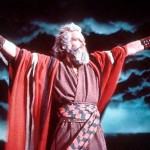Why Heston Deserves a Stamp of Approval
 The Post Office launched its "Legends of Hollywood" series of postage stamps over 20 years ago. But one big name has been overlooked: Charlton Heston.
The Post Office launched its "Legends of Hollywood" series of postage stamps over 20 years ago. But one big name has been overlooked: Charlton Heston.
Almost three years after his passing at age 84 from complications due to Alzheimer's Disease, Hollywood -- and Republican -- icon Charlton Heston is once again "starring" in a new campaign: this time to honor his considerable body of work in film and on stage with a U.S. Postal Stamp commemorating him.
On Wednesday, December 8th, a press event near Heston's star at 1628 Vine Street on the Hollywood Walk of Fame helped drum up support.
The US Post Office launched its "Legends of Hollywood" series over 20 years ago, with previous honorees including Humphrey Bogart, Marilyn Monroe, James Dean, Lucille Ball, Bette Davis, Katharine Hepburn, James Cagney, Bob Hope, Jimmy Stewart, and John Wayne (along with naturalized legends like Alfred Hitchcock and Audrey Hepburn, and small-screen superstars like Jackie Gleason, Ozzie and Harriet, and Ed Sullivan.)
For those whose only remembrances of Heston are in a few fading-color 1950s epics on TCM -- or worse, in what even many liberal critics consider Michael Moore's nadir, an interview for Bowling for Columbine taped when he was nearly 80 and already battling senility and Alzheimer's (he still managed to hold his own against Moore) -- here are a few highlights. Born in 1923 and raised in the Depression as a child of divorce, Heston was as quintessentially self-made as any of his main characters, earning a drama scholarship to Northwestern before leaving to fight World War II, and making his stage debut in 1948 in Antony and Cleopatra.
Heston was noticed by Hollywood after starring on several early TV showcases of live theatre (most notably Studio One), and by 1956, played his most iconic role of all -- Moses -- in Cecil B. DeMille's blockbuster The Ten Commandments. He worked with Orson Welles (cast somewhat less-than-credibly as a Mexican-American) in Touch of Evil, largely considered (along with Psycho, which also starred his Touch co-star Janet Leigh) as the last of the great Hollywood "film noirs." In 1959, he returned to the historical epics with Ben-Hur, for which he won the Oscar, followed by El Cid, a role as Michelangelo in The Agony and the Ecstasy, and a 1971 all-star production of Julius Caesar (with Diana Rigg, Richard Chamberlain, Robert Vaughn, and Jason Robards, among others.)
By 1968, he moved from the past to the future with the sci-fi classic Planet of the Apes followed by The Omega Man and Soylent Green, capping things off with the all-star "disaster movie" Earthquake in 1974. He then moved on to TV (most notably the guilty-pleasure Dynasty spinoff The Colbys and several TV movies) and returned to the stage, becoming the virtual king of the Los Angeles Music Center, especially playing his first love of Shakespeare.
But what makes Heston notable is how he -- perhaps even more than Wayne or Stewart -- epitomized the political consciousness of the "Greatest Generation" of World War II and Korea, of which he was a part. While today he is considered by many to be a strictly right-wing icon (due mainly to his outspoken membership in the National Rifle Association, which he directed from 1998 to 2003), the truth is far more interesting. Heston campaigned avidly for John F. Kennedy in 1960, and even picketed the showing of one of his own movies at an openly segregated movie theatre, going on to march arm-in-arm with African Americans for civil rights "long before it was fashionable," as he mordantly noted. He even opposed the Vietnam War, and was approached in 1969 by the Democratic Party to run for Senate.
As the counterculture took control, though, Heston responded by taking the same journey many if not most of his fellow "demographic" did, appalled by the move to show-offy "identity politics" and the embrace of "gangsta" culture. He spoke out against violent rap songs against the backdrop of the horrifying Rodney King riots of 1992, and said that political correctness was "tyranny with manners."
When Heston died in 2008, Nancy Reagan and George and Barbara Bush both released statements that they were "heartbroken" at his passing, noting that he was "a man of character and integrity with a big heart." As befitting this legacy, the support for Heston's commemorative stamp has been bipartisan, with quotes from industry figures from Mike Medavoy to Bruce Herschenson, plus 1600 signatures and counting. To add your voice to the petition, you can post here.
Charlton Heston was indeed one of the greatest actors of his generation. No one played more heroic or memorable roles than did he – whether as Moses in The Ten Commandments, Judah Ben-Hur, El Cid, or Colonel George Taylor in The Planet of the Apes. He was one of the original inductees in 1960 into the Hollywood Walk of Fame and his star was placed in front of the famous Brown Derby. We are happy to endorse your efforts to secure the stamp in his memory. —Leron Gubler, President & CEO of the Hollywood Chamber of Commerce
He is a true American hero for the things known by all and things not known by most. … He traveled often to South Vietnam during the war to meet with our troops there. He did it without fanfare, stating that his reward was to see our troops and to be with them. —Bruce Herschensohn, American political commentator and senior fellow at the Pepperdine University School of Public Policy
Charlton Heston was an iconic American actor known everywhere in the world … As a friend and family man, patriotic and very giving to his community, in my opinion he deserves to have his image on a US stamp. —Mike Medavoy, Chairman and CEO of Phoenix Pictures